Outsource SEO Link Building: Costs, Risks & Better Options in 2025

Eliza Forgacs
Outsource SEO link building sounds like the perfect shortcut: pay someone else to do the slow, boring, and borderline painful work and watch the rankings roll in. If only it were that simple.
Outsourced link building often comes with sky-high costs, shady tactics, and the sinking realization that you’re basically paying someone to spam inboxes on your behalf.
In this guide, we’ll break down the real pros and cons of backlink outsourcing in 2025, what it actually costs (brace yourself!), and most importantly, the smarter alternatives, aka Ranking Raccoon which can help you achieve faster results without losing control of your SEO strategy.
Why Do Businesses Outsource SEO Link Building?
Because link building is painful! Chasing site owners, begging for guest posts, and sending the 11th “hey, just following up” email isn’t anyone’s dream job.
So outsourcing SEO link building seems like the big red easy button—a promise of relief. Here are the main drivers behind it:
- Saving time
SEO teams are already drowning in audits, keyword maps, and content calendars. Outreach and link building add significant overhead to this mix, so paying someone else to handle it simplifies that.
- Believing in expertise
Many outreach agencies claim they have established relationships and well-tested outreach pipelines. But do they really identify the most high-value link partners for you? You’ll never know.
- Speeding up scalability
Do you need 50 backlinks this quarter? Agencies can bring the numbers and get you results fast. But will those 50 links be all high-quality backlinks that help move your rankings? Unlikely.
- Budget restrictions
Hiring full-time staff and coughing up money for the extra SEO tools can be expensive. Paying an agency monthly seems easier and cheaper, especially for small or medium businesses that don't (yet) want a full in-house team of link builders.
- Impatience for results
For quicker results, many brands turn to outsourcing link building. They want to see the numbers go up and up, yet it can be a lot like gambling. Big falls don’t happen after steady growth, but only after sudden jumps.
In short: Businesses outsource link building because it feels like a shortcut through the SEO grind. But as with most shortcuts, you often discover the scenic route would have been safer, and cheaper in the long run.
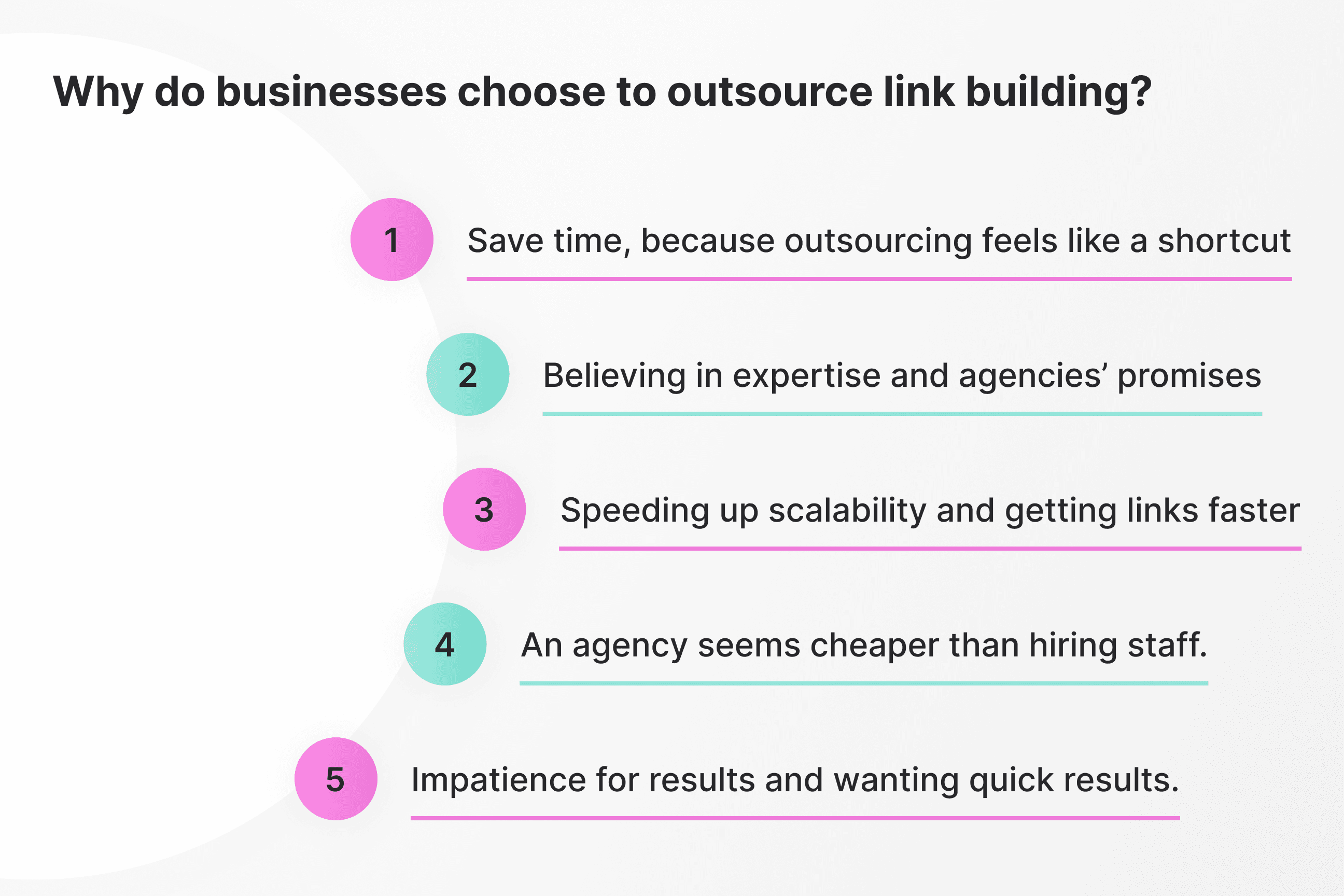
How Much Does Outsourcing Link Building Really Cost in 2025?
More than you think, and often for less than you hoped.
Between inflated agency retainers, per-link markups, and hidden management fees, the price tag of outsourcing has ballooned—sometimes into five figures a month. Let’s break down what you’re actually paying for, and whether the ROI justifies the bill.
Key Statistics About Outsourcing Costs
It’s time to talk dollars. Here are up-to-date benchmarks and insights into what link building costs in 2025:
- According to Editorial.Link’s report, the average “fair price” SEOs quoted for one high-quality backlink is $508.95.
- The same survey points out that the average minimum monthly budget required in highly competitive niches is around $8,406.
- According to fresh statistics, acquiring one high-quality backlink now often exceeds $1,000, and the average paid backlink costs around $361.
- Link.Build’s study shows that monthly retainers for high-quality outsourced link campaigns range from $3,000 to $25,000+.
It is good to keep in mind that costs vary dramatically by niche, content quality, outreach difficulty, and agency methodology.
"Last week, I audited a SaaS client’s backlink profile. They proudly showed me a 'high-DR link' they paid $500 for. At first glance, everything looked fine… but when I checked the real data, it was a disaster."
Read the full conversation here.
What Does All This Mean for ROI?
ROI depends on relevance. A $500 link that drives rankings (and traffic) is worth infinitely more than 10 junk links at $50 each. Outsourcing can deliver ROI—but experience shows only if you pay premium prices.
- A well-placed, relevant link can move rankings, traffic, and conversions—but only if it’s from a site with real traffic and topical relevance.
- Cheap costs are tempting, but often temporary, low impact, or risky. Higher cost doesn’t always mean better results, but relatively good links require investment.
In many cases, outsourced link building remains more expensive per link than building it internally (over the long run) or via community platforms. For instance, The Blueprints outlines that while outsourcing leads to quick links, in-house efforts tend to decrease cost per link after efficiency gains.
An Alternative Option for Link Building: Try Ranking Raccoon
If outsourcing worries you (and it should), there’s a smarter path: community-based collaboration. Enter Ranking Raccoon—a network of vetted SEO professionals and site owners working together to build backlinks, exchange opportunities, and maintain quality.
Instead of paying $5,000 a month to an agency that may or may not deliver, you could join Ranking Raccoon:
1. Wallet-friendly solution
You get access to the full database of placements, outreach connections, and site owners for only $25/month. It’s a membership fee, on this platform paying for links or placements is not an option—it’s absolutely forbidden. (There is a lite plan too—you can use it for free, but with a few limitations.)
2. Clear & transparent
No black box nonsense; you see who you’re collaborating with, where your links come from and where they go. What also makes link building easier, is that on Ranking Raccoon every site is checked manually by us—and we guarantee a spam-free experience.
3. Community-driven quality
On Raccoon, we all share the same goal: build links, connections and grow together. Since participants are SEO professionals and site owners, there’s more incentive to maintain traffic, relevance, and placement quality.
4. Links without the spammy begging
You connect directly with site owners, so outreach is more peer-to-peer, not blind cold emailing. You can talk about the details via in-platform chat, which has much higher response rates.
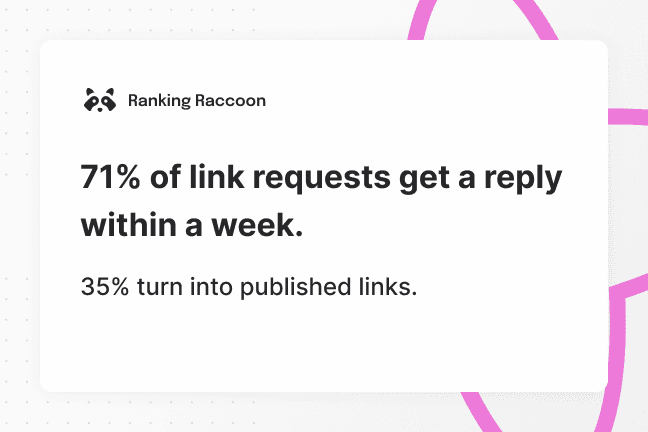
5. Long-term relationships, not just backlinks
Beyond links, you can build partnerships with other professionals and have a mutually beneficial collaboration. You can consider ethical backlink exchange, guest post opportunities and so much more.
Ranking Raccoon lets you harness the benefits of outsourcing link building—speed, access, and volume. But it also maintains the pros of having an in-house team, like having control, learning curve, and certain quality (at the fraction of the price).
So before you throw cash at outsourcing, ask yourself: Wouldn’t you rather pay less and keep control?
If You Still Decide to Outsource SEO Link Building
So, you’ve looked at the trenches, smelled the smoke, and still think outsourcing SEO link building might be beneficial to you. Fair enough. But before you hand over your budget to some agency, let me walk you through what most people miss—and what actual SEO veterans wish someone had warned them about. Because outsourcing can work… or blow up spectacularly, depending on how you approach it.
Common Mistakes in Outsourcing Backlinks
Seen it all, and it can be ugly. If you outsource link building without thinking, you'll pay for mistakes that’ll haunt you for months. Below are the major screw-ups—and how to avoid them, Raccoon-style.
1. Chasing quantity, not quality – 50 random blogspot links ≠ 5 relevant authority links.
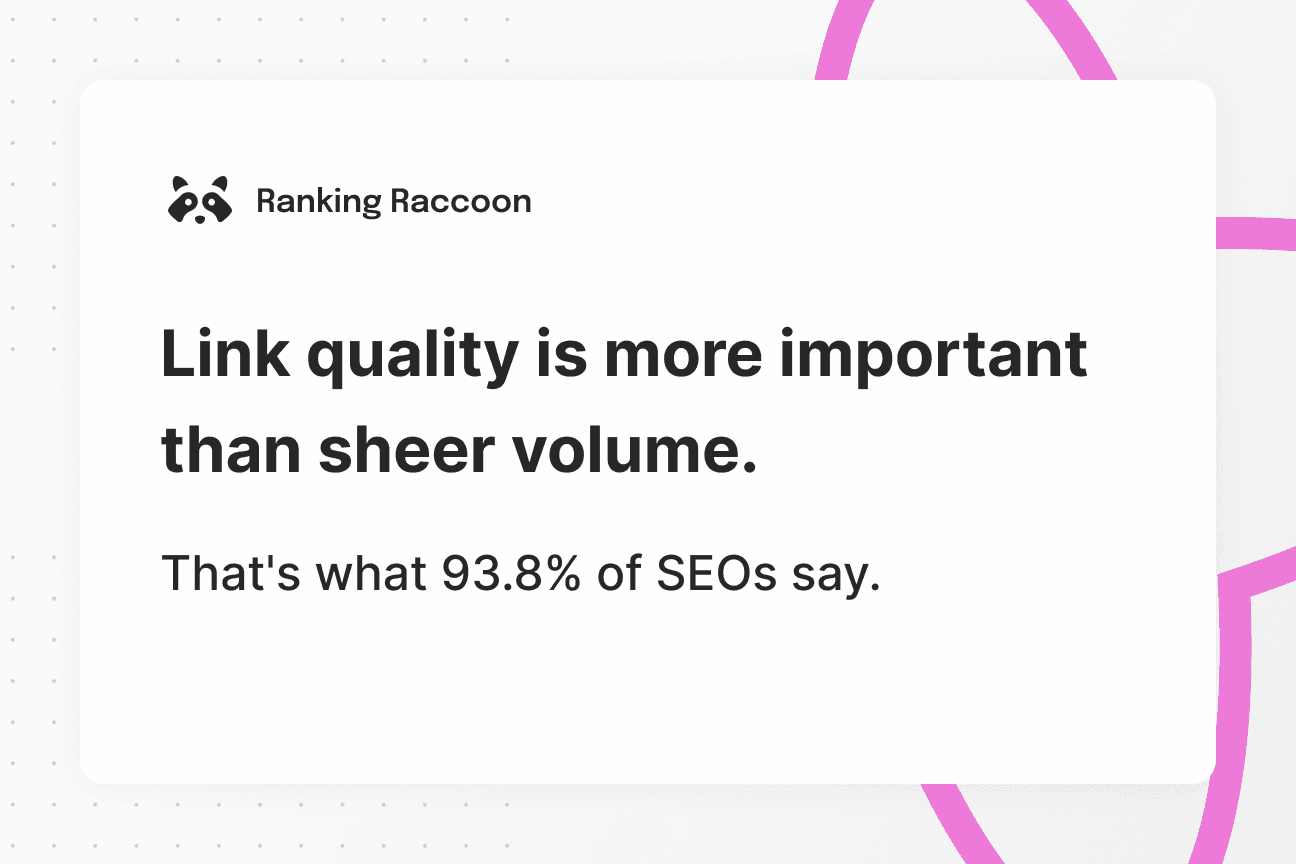
2. Choosing by price alone – If it looks too good to be true, unfortunately experience says it definitely is.
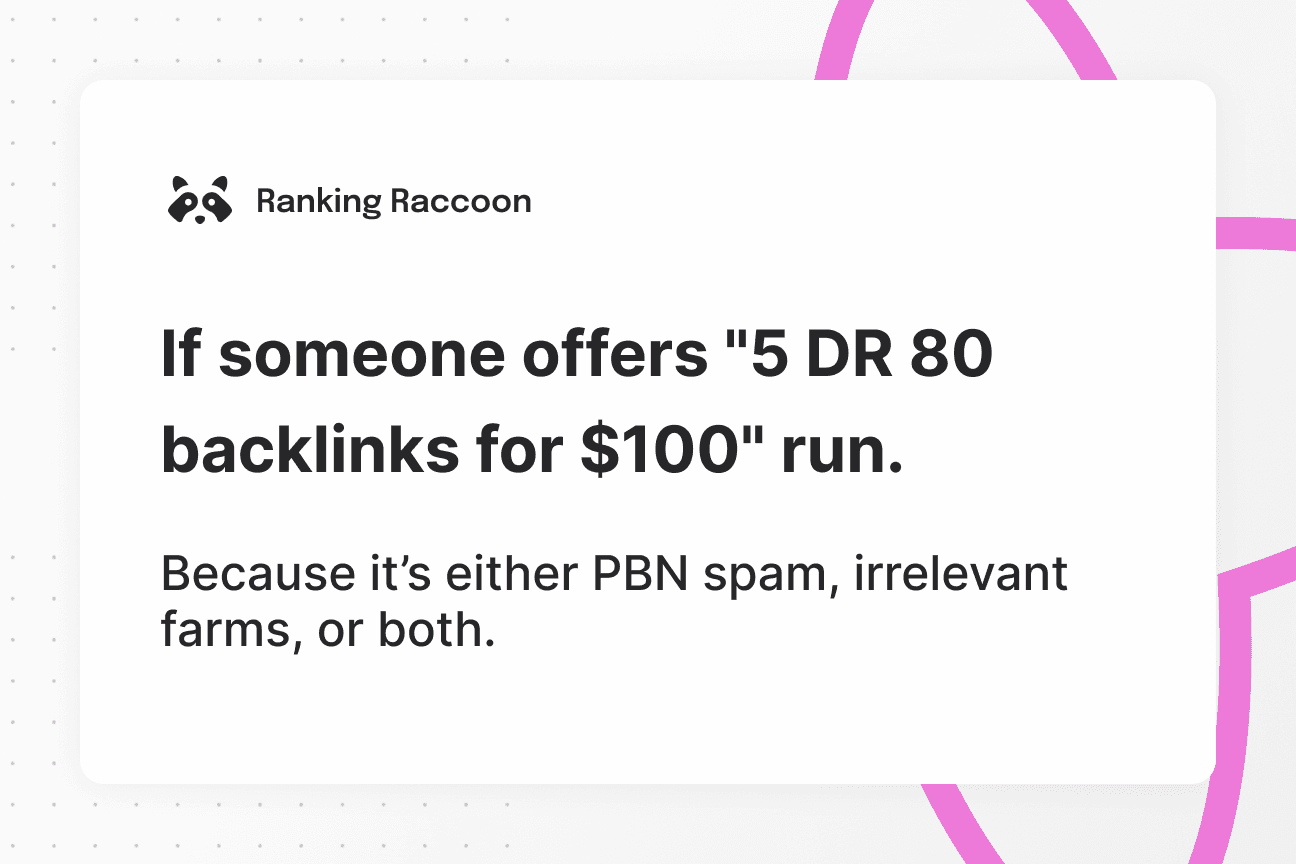
3. No oversight – Trusting agencies blindly leads to toxic link profiles. You have to have at least some control over your backlink profile.
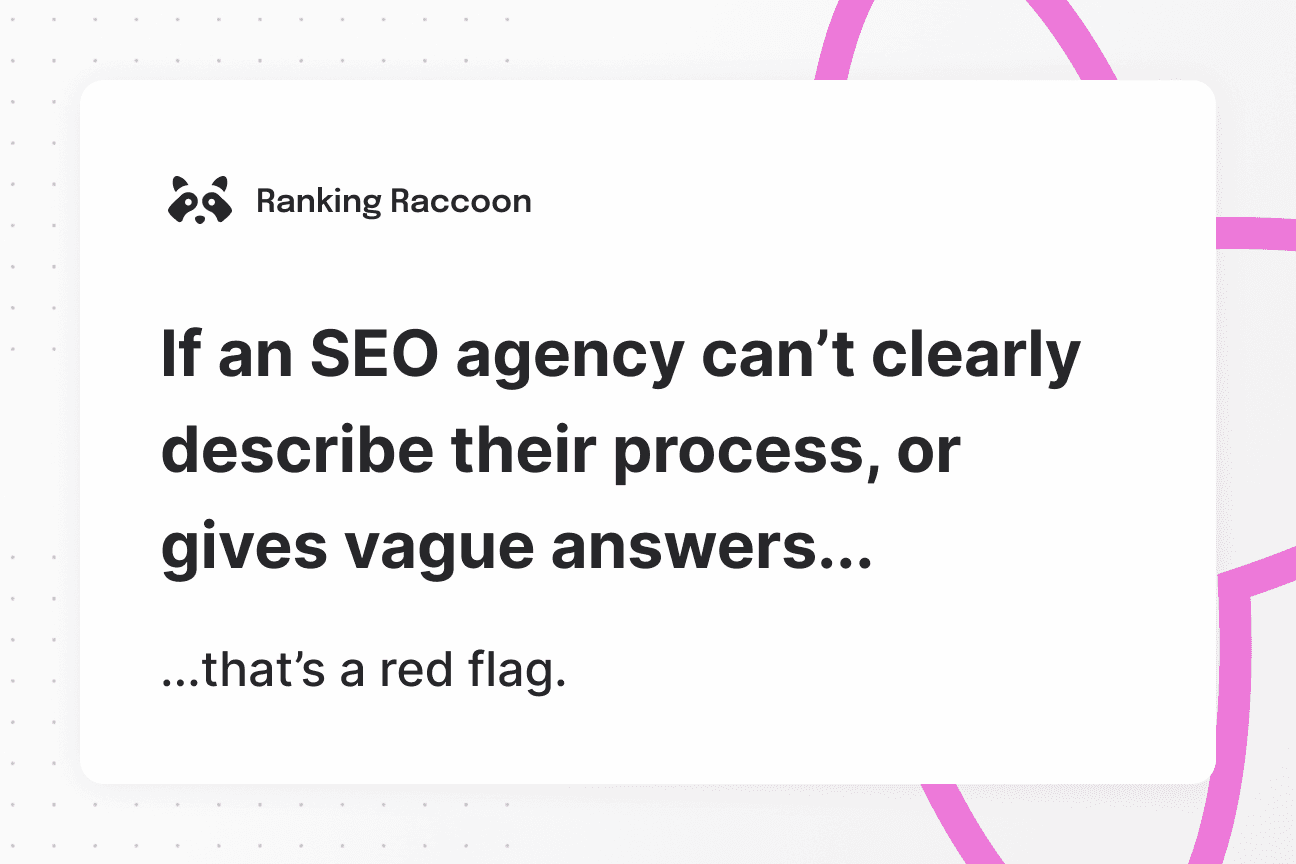
4. Ignoring relevance – Believe me, a fintech startup doesn’t need backlinks from a recipe blog. (Yes, it happens.)
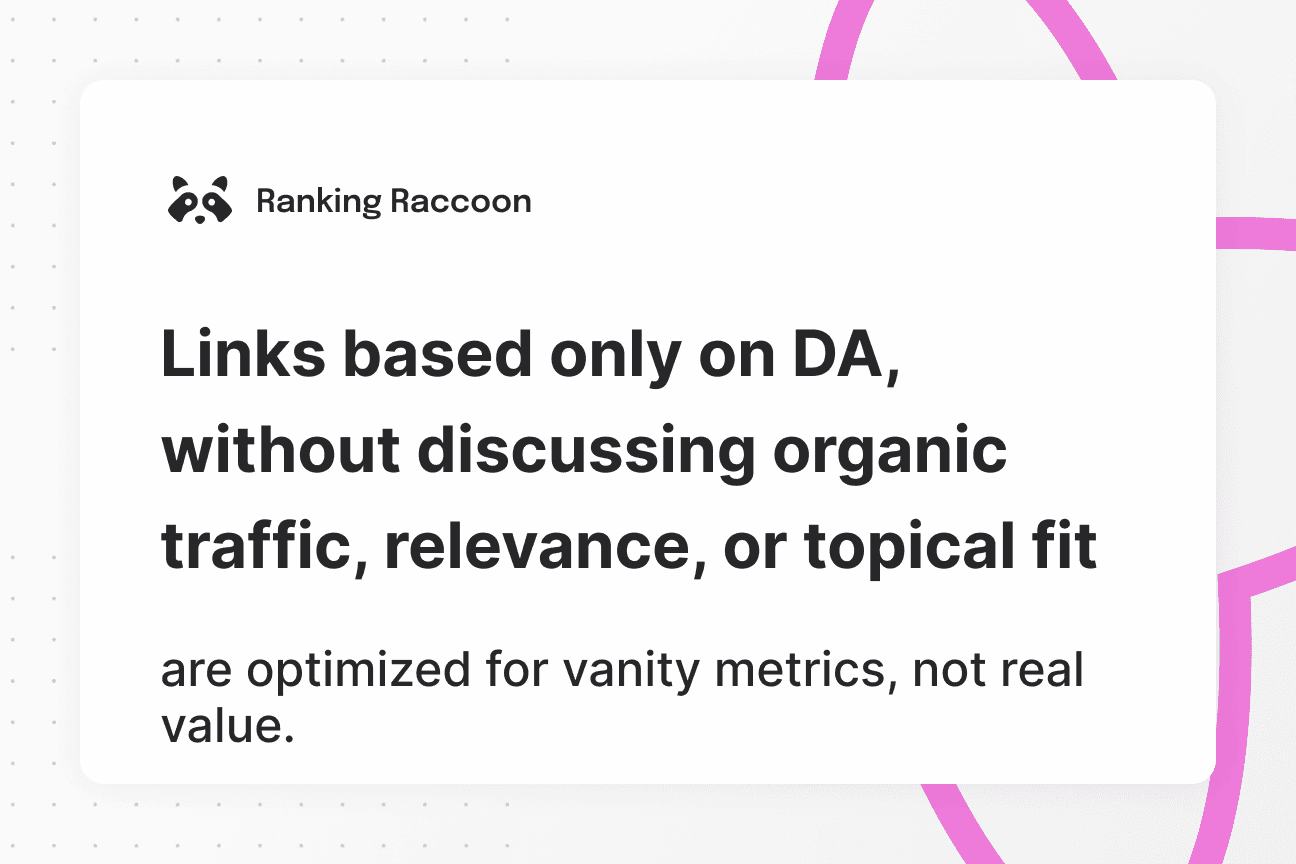
Smart Steps to Avoid Disaster:
Okay, you want to outsource anyway. Fine—let’s make sure you do it in a way that doesn’t torpedo your SEO results:
- Set clear, measurable metrics upfront
Define what success means for your business; is it real traffic, rankings, referral conversion? Don’t just keep an eye on DR number or vanity metrics.
In this article you can learn more about the metrics that actually count: 5 Link-Building Metrics You Got to Track in 2025.
- Require proof of outreach
Never just take them at their word. Ask for proof, like logs, past examples, and negotiation threads. If they refuse, it’s a serious red flag.
- Qualify link sources carefully
Only accept placements from sites that:
- Have consistent organic traffic
- Are topically relevant
- Aren’t part of link farms or PBNs
- Show natural anchor text and content context
- Negotiate replacement & warranty terms
If a link drops, gets removed, or becomes no-follow, you should have the right to replacement or refund. Make that contract clause non-negotiable.
- Keep some control in-house
Even if outsourcing, retain strategic decisions, content, and final approval. Review everything before it goes live. Yes, it might take time and effort, but that oversight is what prevents disasters.
Even when following best practices, outsourcing link building still carries risk. As The Backlink Company stats show, link building is more expensive than ever, and the wrong placements or tactics can cost dearly. So if you're going to outsource, at least make sure you're the one holding the map, not just paying for it blindly.
In-House vs Outsource Link Building: What Works Best?
There’s no right model. Different goals, brands and scenarios require different approaches. In-house solutions and outsourcing SEO link building each have handicaps, and of course advantages.
In-House Link Building
Pros:
- Full control over strategy, relevance, content, anchors, and oversight.
- Better alignment with your brand, messaging, and content calendar.
- Learning and institutional knowledge develop internally.
- Lower long-term cost per link (once systems, tools, and processes are set up).
Cons:
- High upfront investment: hiring, training, buying tools, etc.
- Slower scaling, especially early on.
- Risk of burnout and resource constraints.
Outsource Link Building
Pros:
- Faster ramp-up time. You can buy a lot of links quickly.
- Access to outreach, content production, and vendor networks without internally managing them.
- Less overhead in HR, training, management of staff/tools.
Cons:
- Higher cost per link and ongoing retainer fees.
- Less control, transparency, and often weaker relevance.
- Dependency on external providers, which may change strategy or service quality over time.
Hybrid Model: Might Be a Practical Middle Ground
Many companies choose a hybrid approach: keep strategy, content, and quality control in-house; outsource repetitive outreach, placements, or bulk tasks. That gives a balance between speed and control.
According to The Blueprints, here’s a rough 2025 cost comparison:
“Choosing between insourcing and outsourcing your link building isn’t a one-size-fits-all decision. I’ve seen companies succeed with both approaches, and the right choice really comes down to your specific situation.
Outsourcing might be your best bet if you’re a growing business with limited time but some budget. Insourcing could serve you better if you’re established with marketing team capacity and want long-term assets. For many of you, the hybrid approach offers the perfect balance.”
The key is: what matters most—control, cost, speed, or learning? The best model depends on your business’s size, goals, and capacity.
We built Ranking Raccoon to give a chance to businesses, marketers and SEOs to skip all the risky parts and exchange high-quality placements transparently. For $25/month, you get access to vetted opportunities, direct collaboration, and faster link building without losing control of your strategy. Think of it as outsourcing’s smarter cousin—cheaper, cleaner, and way less likely to blow up in your face.
Final Thoughts: Outsourcing SEO Link Building vs. Smarter Alternatives
Outsourcing SEO link building can work, and for large enterprises with budget, it may even seem essential. But for many businesses, it’s a costly shortcut that often delivers less than promised.
Smarter options do exist. A community-based platform like Ranking Raccoon offers access to link opportunities, a more successful outreach and transparent collaboration—all without the questionable, high-markup structure of traditional agencies. At $25/month, it provides a way to scale link building with control, relevance, and cost efficiency.
Before signing another retainer, ask:
- Am I buying transparency or just convenience?
- Is the link truly relevant and valuable?
- Could I achieve similar or better results via a vetted, peer-based network?
Happy link building!
Outsource SEO Link Building FAQ
Is link building still good for SEO?
Yes. Backlinks remain one of Google’s top ranking signals, and in recent surveys over 90% of SEO professionals confirm that links are still crucial—especially for E-E-A-T (Experience, Expertise, Authoritativeness, Trustworthiness) and AI search visibility. Just don’t confuse “links are valuable” with “all links are valuable.” (Spoiler: they’re not.)
How much should I pay for link building?
It depends on whether you’re buying direct placements, paying per link, or on an agency retainer. In 2025, average market rates hover around $150–$500 per quality link or $5,000–$15,000/month for agency packages. Using a networking platform like Ranking Raccoon, you can get off with a $25/month membership. And remember: in Google’s eyes, paying for links is basically a crime—they may not haul you to court, but they can (and do) penalize sites that get caught.
How to outsource link building effectively?
Treat it less like “handing over the keys” and more like “hiring a contractor.” Demand outreach logs, approve target lists, insist on niche relevance, and monitor traffic metrics. Or in plain English: stay involved, or be prepared to clean up the mess later.
Is link building illegal?
No, but manipulative link schemes are against Google’s guidelines. That means buying PBN links, spamming forums, or link-exchanges at scale. Google won’t send you to jail, but they might tank your rankings—and for a business, that’s almost worse.
When should I avoid outsourcing?
If you’re in a sensitive niche (finance, health, YMYL topics), where quality and trust are non-negotiable. Or if your budget is tiny (under $1,000/month). Or if you’re not ready to review what your provider is doing. Blind outsourcing is like gambling with your domain’s reputation.

Eliza Forgacs
Marketing Manager